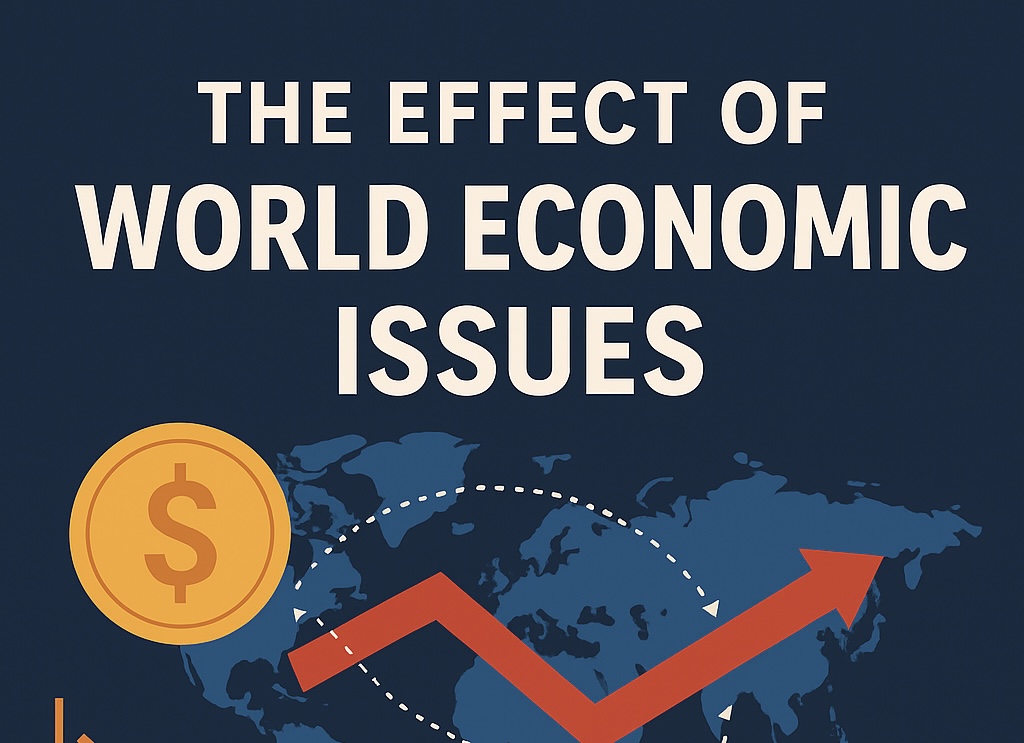
In today’s interconnected world, no country functions in isolation. An economic decision made in the United States can affect businesses in Africa, just as a financial crisis in Asia can ripple across Europe. Globalization has turned the world into one large marketplace where goods, services, money, and even problems travel faster than ever before. This means that world economic issues—ranging from inflation, unemployment, and trade wars, to pandemics and climate change—affect not just governments and corporations but also individuals in their daily lives.
In this blog, we’ll break down the major world economic issues and their effects on global growth, businesses, and ordinary people.
1. Inflation and the Rising Cost of Living
One of the most pressing economic challenges today is inflation. When inflation rises, the purchasing power of money falls. This means the same amount of money buys fewer goods and services than before.
Causes of Inflation:
- Rising energy and food prices
- Global supply chain disruptions
- Excess government spending
- Geopolitical tensions affecting trade
Effects on Daily Life:
- Families spend more on basic needs like food, rent, and transport.
- Savings lose value if not invested properly.
- Small businesses struggle with increased operating costs.
For example, the Russia-Ukraine conflict has led to soaring oil and grain prices, which directly affects the cost of bread in Africa or fuel in Europe.
2. Unemployment and Job Insecurity
Economic downturns often result in job losses and reduced employment opportunities. When businesses cannot cope with rising costs or reduced demand, they resort to layoffs.
Effects of Unemployment:
- Increased poverty levels and inequality
- Decline in consumer spending, slowing economic recovery
- Rise in crime and social unrest in some regions
The COVID-19 pandemic highlighted this when millions worldwide lost their jobs, forcing governments to provide relief packages and unemployment benefits.
3. Global Supply Chain Disruptions
Another critical issue is supply chain instability. The pandemic exposed how fragile international trade networks can be. A factory shutdown in China can delay car production in Germany or gadget shipments in the U.S.
Causes of Disruptions:
- Natural disasters
- Geopolitical tensions (e.g., U.S.–China trade wars)
- Global health crises like pandemics
Effects:
- Scarcity of essential goods
- Increased shipping costs
- Delays in product delivery, frustrating consumers
This impacts everyone from big corporations to small online businesses relying on imported goods.
4. Debt Crisis and Financial Instability
Many developing countries struggle with national debt. Borrowing from international lenders helps governments fund infrastructure and welfare, but excessive debt creates long-term risks.
Effects of Debt Crisis:
- Currency devaluation, making imports expensive
- Reduced government spending on education, healthcare, and security
- Economic instability that discourages foreign investment
For instance, nations like Sri Lanka and Argentina recently faced debt crises, leading to political protests and instability.
5. Climate Change and Economic Pressure
Climate change is not just an environmental issue—it’s an economic one. Rising sea levels, extreme weather, and droughts disrupt farming, infrastructure, and housing.
Economic Effects of Climate Change:
- Higher insurance and disaster recovery costs
- Food shortages due to reduced agricultural productivity
- Mass migration from vulnerable regions, increasing global tension
The shift towards renewable energy is both a challenge and an opportunity. While fossil fuel industries face decline, green technology sectors are creating new jobs.
6. Geopolitical Conflicts and Trade Wars
Conflicts between nations significantly impact global trade. For example:
- Sanctions on Russia disrupted global oil, gas, and wheat markets.
- U.S.–China trade wars led to higher tariffs, increasing costs for businesses and consumers.
Effects of Geopolitical Tensions:
- Uncertainty in global markets
- Reduced foreign investments in conflict zones
- Increased military spending diverting funds from development projects
These conflicts ripple across borders, proving that economic peace often depends on political stability.
7. Technological Change and Economic Inequality
Technology is reshaping economies rapidly. While automation and artificial intelligence boost productivity, they also cause job displacement.
Positive Impacts:
- Increased efficiency in production and services
- Growth of digital economies and e-commerce
- New opportunities in fintech, renewable energy, and AI
Negative Impacts:
- Widening gap between rich and poor
- Job loss in traditional sectors like manufacturing and retail
- Cybersecurity threats affecting global finance
The digital divide means developed nations advance faster, leaving developing countries struggling to keep up.
8. The Role of International Organizations
Institutions like the International Monetary Fund (IMF), World Bank, and World Trade Organization (WTO) play key roles in stabilizing economies. They provide loans, regulate trade, and help countries in crisis.
However, critics argue that these organizations sometimes impose harsh conditions on developing nations, making recovery harder.
9. How Individuals Can Cope with Global Economic Issues
Even though these issues seem far beyond individual control, people can take steps to reduce their impact:
- Diversify income streams: Freelancing, online businesses, or side hustles.
- Invest wisely: Protect savings from inflation by investing in real estate, stocks, or commodities.
- Financial literacy: Budgeting, saving, and managing debt are essential.
- Support local businesses: Strengthens the local economy and reduces reliance on fragile global supply chains.
Conclusion
World economic issues are deeply interconnected, and their effects are unavoidable in today’s globalized society. Inflation, unemployment, supply chain disruptions, debt crises, and climate change shape not only government policies but also everyday decisions what we eat, how we work, and even the stability of our communities.
The challenge for the global community is not just to react to these issues but to proactively build resilient systems that prioritize sustainable growth, equity, and innovation. While governments and international organizations work on large scale solutions, individuals and businesses must also adapt, innovate, and prepare for the future.
The economy is not just numbers on a chart it is the pulse of daily life worldwide.
